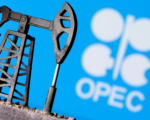Goldman Sachs Predicts Crude Oil Spike Amid Potential Iran-Israel Conflict

Goldman Sachs has warned that oil prices could rise by as much as $20 per barrel if Iranian oil production is hit due to Israeli retaliation for Iran’s recent missile attack. Oil prices are already on the rise, with U.S. crude futures climbing by 5% on Thursday and continuing to increase on Friday. The market is reacting to fears of disruptions to Iran’s significant oil output amid escalating tensions between Iran and Israel.
Daan Struyven, Goldman Sachs’ co-head of global commodities research, estimated that a sustained reduction of 1 million barrels per day in Iranian production could push oil prices up by about $20 per barrel next year, assuming that OPEC+ does not increase production to compensate. If major OPEC+ members like Saudi Arabia and UAE step in to offset the shortfall, the price rise could be closer to $10 per barrel.
Since the Israel-Hamas conflict began in October 2023, the oil market had remained stable due to increased U.S. production and low demand from China. However, the recent missile attacks by Iran have reignited concerns about supply disruptions. Iran produces about 4 million barrels of oil per day, accounting for roughly 4% of global supply, making it a key player in the global oil market.
Saul Kavonic, an energy analyst at MST Marquee, raised the possibility that Kharg Island, responsible for 90% of Iran’s crude exports, could become a target for Israeli strikes. This would significantly impact Iran’s ability to export oil, adding further pressure to the global market.
Another major concern is the Strait of Hormuz, a crucial channel through which nearly 20% of the world’s daily oil production flows. Any conflict that disrupts transit through this region could lead to even more dramatic spikes in oil prices.
Fitch Solutions issued a note stating that in the event of a full-scale war, Brent crude could rise above $100 per barrel, and any closure of the Strait of Hormuz could push prices to $150 per barrel or higher. While the probability of a full-scale war is seen as relatively low, the risk of miscalculation or escalation is now elevated.
Although some analysts believe that OPEC+ has enough spare capacity to cover any shortfall in Iranian oil, most of this capacity is concentrated in the Middle East, which could itself be drawn into a broader conflict if tensions worsen.





















